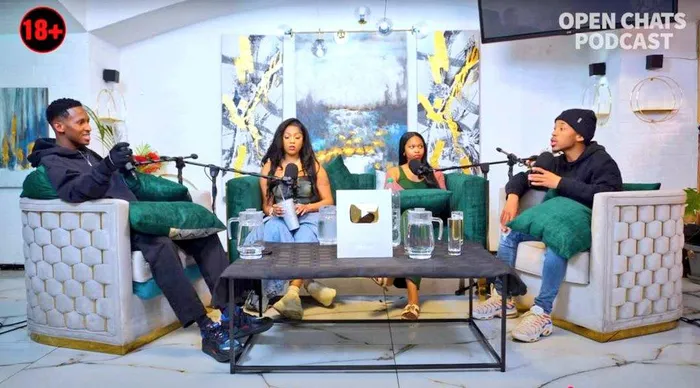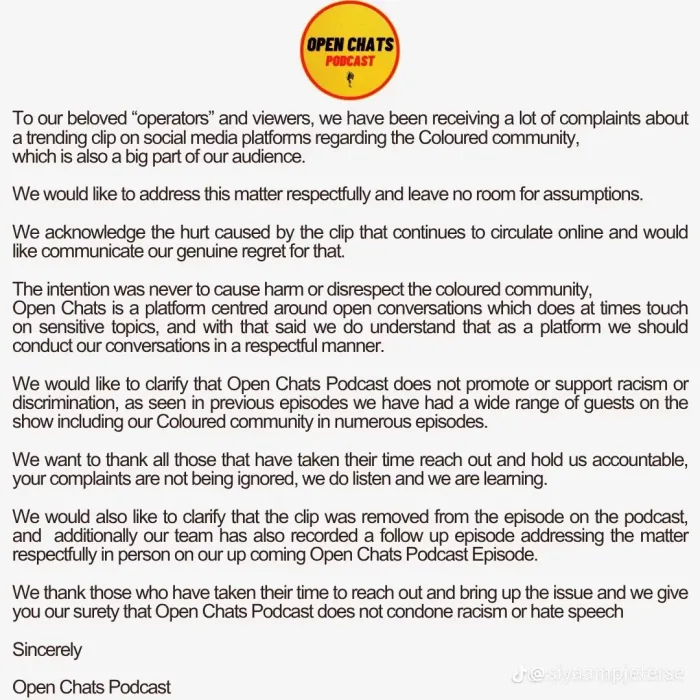From banter to bigotry: unpacking the toxic trends in South Africa's podcast scene

Open Chats Podcast have sparked a profound uproar across South Africa, disrupting the nation's dialogue on race, dignity, and freedom of speech.
Image: X
“Coloureds apparently chow each other chief, siblings … I would believe that because coloureds are crazy.”
A seemingly casual remark, yet these words from the "Open Chats Podcast" have sparked a profound uproar across South Africa, disrupting the nation's dialogue on race, dignity and freedom of speech.
The reaction was swift, raw and loud from celebrities to political parties to fellow podcasters: "We’ve had enough."
While the "Open Chats Podcast" hosts Am, Cino and Mtho are hardly household names, they’ve now become so for all the wrong reasons.
Social media creator Kwezi summed up what many felt: “Your freedom of speech ends where my dignity begins. What you’re doing isn’t brave or edgy. It’s lazy racism dressed up as opinion.
"We’ve seen this before. Say something inflammatory, target a vulnerable group, rake in the clicks, and apologise when the pressure mounts. Lather. Rinse. Repeat."
It’s a formula that’s worked for controversial creators like Mac G, Andrew Tate, Joe Rogan, and the Fresh & Fit crew in the US, whose brands thrive on humiliating women and weaponising shock for views.
And South Africa? We’re just catching up.
“They made it mainstream: misogyny, transphobia, slut-shaming, anti-blackness and casual vulgarity, all packaged as entertainment,” said digital activist and pop culture commentator Roman Botha, who’s been vocal about global podcast trends.
“What we’re seeing here is no different. Our local podcast boom is simply importing a toxic blueprint. The global podcasting model is simple: monetise outrage, sell the dehumanisation, and repeat.”
The podcast, in its now-infamous incest joke, has been widely condemned, not only for its ignorance but for its intentional cruelty.
“Would you be proud if your daughter watched this?”
Even controversial commentator Nota Baloyi, often accused of his own inflammatory takes, called the podcast out on their own show.
“What are your daughters going to say when they watch this 20 years from now? Is this something you’ll be proud of?”
Whether you love or hate Baloyi, it’s a rare moment when even he seems to be the voice of reason. When toxic content is being called out by other toxic creators, maybe just maybe, we’ve reached peak absurdity.
Words have weight and consequences
While the "Open Chats Podcast" hosts have since issued an apology, many feel it’s too little, too late. The statement claims “genuine regret”, insists there was “no intention to offend”, and promises “better conduct moving forward”.
But the public is no longer buying half-hearted backpedalling. As one user bluntly put it: “They love dressing their bigoted beliefs as banter.”
Patriotic Alliance councillor Liam Jacobs took things a step further, laying criminal charges against the hosts at Brooklyn Police Station in Tshwane.
“This clip hurt. Action needs to be taken,” Jacobs said in a follow-up video.
“To the podcasters: go read and educate yourselves about coloured people. We are not your punchline.”
His party leader, Gayton McKenzie, echoed this: “If coloured people made those remarks about another race, it would be front page news. We must never allow people to become that comfortable with disrespecting us.”
Maurice Paige, a South African actor, shared his disbelief on TikTok: “Are we seriously going to allow people to speak this badly about coloureds? Are we just going to let it slide?”
Here’s the thing: freedom of speech is not freedom from accountability. South Africa’s Constitution protects the right to dignity just as fiercely as it protects expression.
When that mic becomes a tool of harm, your right to speak collides with someone else’s right not to be dehumanised. Podcast issued a classic "we're learning" PR statement: “We acknowledge the hurt... The intention was never to cause harm… Open Chats does not condone racism...”
They also mentioned they’ve removed the clip and recorded a follow-up episode addressing the issue. But for many, the damage is done, and an apology feels hollow.
Below are some of the comments flooding platforms from coloured South Africans who are tired of being the punchline for lazy content strategies.
“They love dressing their bigoted beliefs as banter.”
“Freedom of speech went over their heads.”
“We don’t indulge in incest. And we certainly aren’t crazy.”
"Where did they even get that from?”
“We need to ban podcasts. This is getting out of hand.”

As the Open Chats hosts offered an apology claiming “genuine regret,” many doubted its sincerity
Image: X
Lest we forget, TV personality Minnie Dlamini recently filed a R2.5 million lawsuit against Podcast and Chill with MacG for hate speech and gender-based harassment.
In a 2025 episode, she was mocked in vile terms, facing years of objectification for simply speaking out. “What occurred wasn’t banter - it was a grotesque and deeply harmful violation of my dignity, my humanity and my constitutional rights as a woman,” said Dlamini.
And honestly? She’s right.
The internet responded with fury but also reflection.
Podcasts can be powerful. But with great reach comes great responsibility. If creators aren’t going to regulate themselves, maybe it’s time we started doing it for them with our voices, our criticism, and yes, our legal action.
Because accountability is not censorship. It’s how we build a healthier media space for everyone. So, to every podcaster out there hoping to go viral: maybe try being clever, not controversial.
Maybe just stop… Maybe … just maybe … grow up!